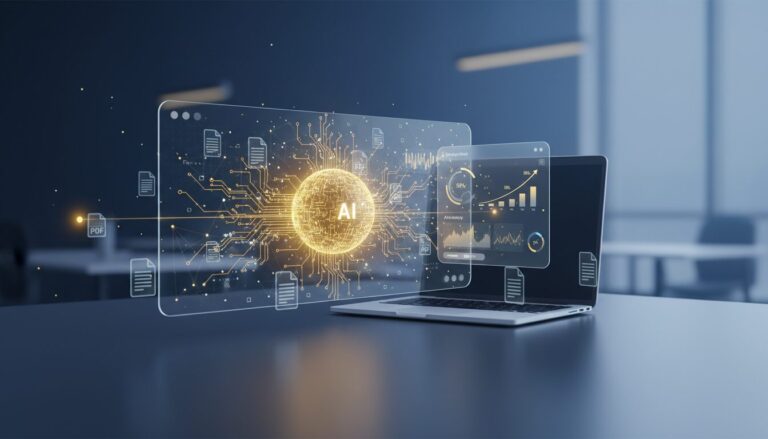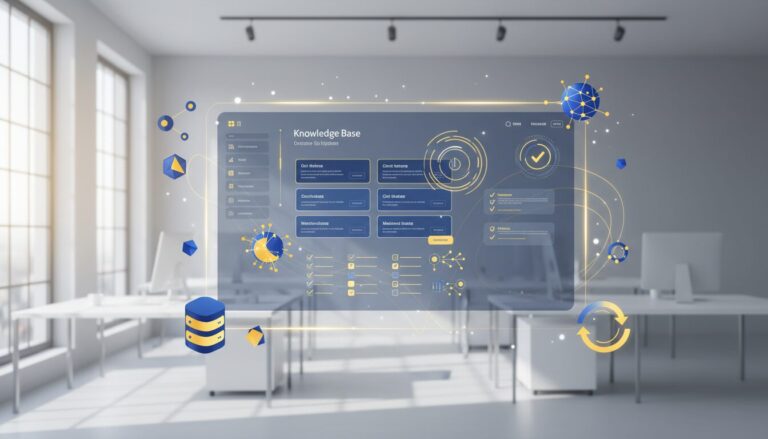Table Of Contents
- Introduction
- Understanding AI in HR and Recruitment
- Key Capabilities of AI Apps in HR
- Benefits of Implementing AI in HR Processes
- Challenges and Considerations
- Getting Started with AI in HR
- Building Custom AI HR Applications Without Coding
- Future Trends in AI for HR
- Conclusion
The human resources landscape is undergoing a remarkable transformation, with artificial intelligence (AI) emerging as a pivotal force reshaping how organizations attract, evaluate, and manage talent. If you’re an HR professional, recruiter, or business owner looking to understand how AI can revolutionize your workforce management, you’ve come to the right place.
Traditional HR processes often involve repetitive, time-consuming tasks that can lead to bottlenecks, unconscious bias, and missed opportunities to identify top talent. AI apps for HR and recruitment are changing this paradigm by automating routine processes, providing data-driven insights, and creating more personalized experiences for both candidates and employees.
In this comprehensive guide, we’ll demystify AI applications in the HR domain, explore their core functionalities, examine their benefits and limitations, and show you how to implement these powerful tools in your organization—even if you have no technical background in AI or programming. By the end, you’ll understand not just what AI can do for your HR department, but also how you can build custom AI solutions tailored to your specific recruitment and talent management needs.
AI in HR & Recruitment
Transforming Workforce Management
Core AI Technologies Powering HR
Machine Learning
Algorithms that improve through experience and data analysis
Natural Language Processing
Technology that helps computers understand and interpret human language
Predictive Analytics
Statistical techniques that analyze data to make predictions about future events
Key HR Functions Enhanced by AI
Resume Screening
Processing thousands of applications in seconds with reduced bias
Interview Automation
Chatbot screening and video interview analysis
Onboarding & Training
Personalized onboarding experiences and learning recommendations
Talent Management
Performance prediction and turnover risk assessment
Key Benefits of AI in HR
Increased Efficiency
Recruiters save up to 14 hours weekly through AI-assisted processes
Improved Quality of Hire
Up to 35% reduction in turnover for roles filled using AI methods
Cost Reduction
Average 75% reduction in cost-per-screen and 70% faster time-to-fill
Build Your Own AI HR Solution
Create custom AI applications for recruitment, onboarding, and talent management—even without coding skills.
Created with Estha AI – No-Code AI Platform
Understanding AI in HR and Recruitment
AI in human resources represents the application of artificial intelligence technologies to enhance and streamline various HR functions. Unlike conventional software that follows pre-programmed rules, AI systems can learn from data, adapt to new inputs, and perform tasks that traditionally required human intelligence.
At its core, an AI app for HR combines several technologies, including:
- Machine Learning (ML): Algorithms that improve through experience and data analysis
- Natural Language Processing (NLP): Technology that helps computers understand, interpret, and generate human language
- Computer Vision: Systems that can interpret and process visual information
- Predictive Analytics: Statistical techniques that analyze current and historical data to make predictions about future events
These technologies work in concert to transform traditional HR processes into more efficient, accurate, and data-driven operations. From automatically screening thousands of resumes to predicting employee turnover risks, AI offers capabilities that extend far beyond what conventional HR software can achieve.
Key Capabilities of AI Apps in HR
AI applications in human resources span the entire employee lifecycle, from recruitment and onboarding to development and retention. Let’s explore the most impactful capabilities these tools offer to HR professionals.
Resume Screening and Candidate Matching
One of the most time-consuming aspects of recruitment is reviewing resumes and identifying qualified candidates. AI recruitment tools can:
Parse and analyze resumes: AI can extract relevant information from thousands of resumes in seconds, understanding different formats, languages, and terminology.
Match candidates to job requirements: Using sophisticated algorithms, AI systems can score and rank applicants based on how well their qualifications align with job requirements, identifying the most promising candidates quickly.
Reduce unconscious bias: When properly designed, AI can focus purely on qualifications and skills, helping to minimize unconscious biases that might influence human recruiters.
Identify passive candidates: AI can analyze professional networks and databases to find potential candidates who aren’t actively job hunting but match desired profiles.
Interview Automation and Assessment
AI is transforming the interview process through several innovative approaches:
Chatbot pre-screening: AI-powered chatbots can conduct initial candidate screenings, asking preliminary questions and providing immediate feedback before human involvement.
Video interview analysis: Advanced AI can analyze video interviews to assess candidate attributes like emotional intelligence, vocabulary usage, facial expressions, and speech patterns.
Skills assessment: AI platforms can administer and evaluate technical assessments, simulations, and job-specific tests to objectively measure candidate capabilities.
Employee Onboarding and Training
Once candidates become employees, AI continues to play a valuable role:
Personalized onboarding: AI can create customized onboarding experiences based on a new hire’s role, experience level, and learning preferences.
Virtual assistants: AI-powered assistants can answer new employees’ common questions about company policies, procedures, and resources, available 24/7.
Learning recommendations: By analyzing an employee’s skills, performance, and career goals, AI can suggest relevant training opportunities and development paths.
Talent Management and Retention
AI excels at analyzing workplace data to support ongoing talent management:
Performance prediction: By analyzing various factors, AI can help identify high-potential employees and predict future performance.
Turnover prediction: AI models can recognize patterns indicating when employees might be considering leaving, allowing proactive retention measures.
Employee engagement analysis: Through sentiment analysis of surveys, communication patterns, and other data points, AI can gauge employee satisfaction and engagement levels.
Personalized career development: AI can recommend personalized growth opportunities based on an employee’s skills, interests, and company needs.
Benefits of Implementing AI in HR Processes
Organizations that effectively deploy AI in their HR functions can realize numerous advantages:
Increased efficiency and productivity: AI automates repetitive tasks, allowing HR professionals to focus on strategic initiatives rather than administrative work. Studies suggest that recruiters can save up to 14 hours weekly through AI-assisted processes.
Improved quality of hire: By objectively assessing candidates based on data rather than gut feelings, AI can help identify truly qualified candidates who might otherwise be overlooked. Companies using AI for recruitment report up to 35% reduction in turnover for roles filled using AI-assisted methods.
Enhanced candidate experience: AI can provide immediate feedback, answer questions promptly, and keep candidates informed throughout the process, creating a more positive impression of your organization.
Data-driven decision making: AI provides HR leaders with actionable insights based on comprehensive data analysis, enabling more informed strategic decisions about workforce planning and development.
Cost reduction: By streamlining processes and reducing time-to-hire, AI can significantly lower recruitment costs. Organizations implementing AI in recruitment report an average 75% reduction in cost-per-screen and 70% decrease in time-to-fill positions.
Challenges and Considerations
While the benefits are compelling, implementing AI in HR isn’t without challenges:
Algorithmic bias concerns: AI systems learn from historical data, which may contain existing biases. Without careful design and ongoing monitoring, these biases can be perpetuated or even amplified.
Data privacy and security: HR departments handle sensitive personal information, making data protection paramount when implementing AI solutions.
Employee acceptance: Both HR staff and employees may be wary of AI implementation, fearing job displacement or impersonal treatment.
Technical implementation hurdles: Traditional barriers to AI adoption include the need for specialized technical knowledge, integration with existing systems, and customization requirements.
While these challenges are real, they’re increasingly surmountable. Modern no-code AI platforms are addressing many technical barriers, making implementation more accessible even to organizations without dedicated technical teams.
Getting Started with AI in HR
If you’re considering implementing AI in your HR department, follow these steps for a successful adoption:
Identify pain points and opportunities: Begin by assessing your current HR processes. Where are the bottlenecks? Which tasks consume the most time? Where might bias be creeping in? Identifying specific challenges will help you target AI solutions more effectively.
Set clear objectives: Define what success looks like. Are you aiming to reduce time-to-hire, improve quality of candidates, enhance employee experience, or achieve other specific goals? Establishing metrics upfront will help you evaluate AI effectiveness.
Start small and scale: Rather than overhauling your entire HR system at once, begin with a pilot project in one area, such as resume screening or candidate engagement. This allows you to learn, adjust, and build confidence before expanding.
Ensure ethical implementation: Develop guidelines for ethical AI use, including regular bias audits, transparency measures, and human oversight of AI decisions that significantly impact individuals.
Prepare your team: Provide training and clear communication about how AI will support (not replace) HR professionals, emphasizing that AI handles routine tasks while humans focus on judgment, creativity, and relationship-building.
Building Custom AI HR Applications Without Coding
Traditionally, creating custom AI applications required significant technical expertise, substantial financial investment, and months of development time. Today, no-code AI platforms are democratizing access to this technology.
With platforms like Estha, HR professionals can build tailored AI solutions without writing a single line of code. Here’s how:
HR chatbots and virtual assistants: Create conversational AI assistants that can answer employee questions about benefits, policies, or procedures, schedule interviews, or provide guidance to new hires during onboarding.
Candidate assessment tools: Develop custom AI applications that evaluate candidate responses to standardized questions, ensuring consistent assessment criteria across all applicants.
Employee development advisors: Build AI advisors that can provide personalized learning recommendations and career development guidance based on an employee’s skills, interests, and company needs.
Interview preparation systems: Create interactive AI applications that help hiring managers prepare for interviews by suggesting questions based on the role and candidate background.
Using an intuitive drag-drop-link interface, platforms like Estha allow HR professionals to transform their expertise into functional AI applications in minutes rather than months. These custom solutions can then be embedded into existing HR portals, shared with the team, or even offered to other organizations.
The key advantage of building custom AI HR applications is the ability to incorporate your organization’s unique values, requirements, and processes—something off-the-shelf solutions often can’t accommodate.
Future Trends in AI for HR
As AI technology continues to evolve, several emerging trends are poised to further transform HR practices:
Augmented intelligence collaboration: Rather than replacing human judgment, next-generation HR AI will focus on augmenting human capabilities, providing increasingly sophisticated decision support while leaving final determinations to human professionals.
Predictive workforce planning: Advanced AI will enable more accurate forecasting of future talent needs based on business growth patterns, market trends, and internal skill development trajectories.
Holistic employee experience management: AI will increasingly connect various aspects of the employee lifecycle, from recruitment through retirement, creating more cohesive and personalized employee journeys.
Voice and emotion analysis: As natural language processing advances, AI will better understand not just what people say but how they say it, enabling more nuanced assessment of candidate interviews and employee feedback.
Ethical AI governance: As AI becomes more prevalent in HR, we’ll see more sophisticated frameworks for ensuring these systems operate fairly, transparently, and in alignment with organizational values.
Organizations that stay ahead of these trends will be positioned to build more effective, efficient, and equitable workplaces.
Conclusion
AI applications for HR and recruitment represent a transformative opportunity for organizations of all sizes. By automating routine tasks, providing data-driven insights, and enabling more personalized experiences, these tools are redefining what’s possible in talent acquisition and management.
The good news is that leveraging AI in HR no longer requires a technical background or extensive resources. With no-code platforms like Estha, HR professionals can create custom AI solutions that address their specific challenges and incorporate their unique organizational values.
As we look to the future, successful HR departments will be those that thoughtfully integrate AI into their processes while maintaining the human touch that’s essential to building strong workplace relationships and cultures. The key is finding the right balance—using AI to handle repetitive tasks and data analysis while allowing human professionals to focus on strategy, creativity, and meaningful human connections.
Whether you’re just beginning to explore AI for HR or looking to expand your current capabilities, remember that the goal isn’t implementing technology for its own sake, but rather enhancing your ability to find, develop, and retain the talent that drives organizational success.
Ready to Create Your Custom AI HR Solution?
Build your own AI applications for recruitment, onboarding, employee development, and more—no coding required.



